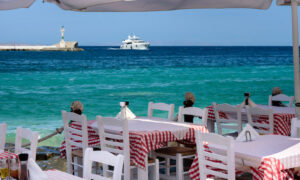(Editor’s note: This is Pt. 2 of a two-part primer to help expats integrate into Greek society, which remains very traditional. You can jump to Pt. 1 here.)
In Pt. 1 of this post, I discussed my friend Nicole’s experience as an example of how encountering a new culture can throw even the most confident person off their game. Being prepared can go a long way towards helping you adjust to your new life and successfully go Greek.
Greece might be perceived as a relaxing place to be – and it is – for those who are coming to lounge on a beach for a week. But, for those of us who live here, the day-to-day reality can be quite chaotic and stressful. Greece definitely has its charms, but it’s good to be prepared to encounter the sometimes-challenging reality of everyday life here.
Some people want to pull their hair out one strand at a time when the disorder gets too great, but many a citizen of the world’s most orderly countries have unexpectedly find their bliss here in the sometimes-charming Bedlam.
Here are some tips to help you get used to your new environs, whether you fall under the category of “allergic to chaos” or “addicted to chaos”:

Speak like a local
I briefly mentioned learning the language in Pt. 1. Working on your Greek is a way to show locals you respect their culture and heritage, and learning the language is an effective and concrete way to start figuring out both the practical and the social side of being a resident here. The truth is that you could get by okay without knowing Greek, but I wouldn’t recommend it.
Some manage quite well but I believe if you want to get to know this passionate, proud and sometimes peculiar nation, you need to take on the challenge of the language. Not only will studying Greek help you with your English (countless English words have Greek roots as you probably know) but it will also surely pique your interest in the timeless mythology, drama and poetry of our Greek forebears and contemporaries.
I won’t lie. It is no mean feat to get to grips with even just the basics of Greek but as we all know, learning a language also indirectly teaches you about culture and context. Learning at least basic Greek is not just useful in a practical sense, but it can also help you to avoid misunderstandings regarding gestures, mannerisms and personal space.
In learning the language, you will begin to understand Greek body language, which can seem quite alien for newcomers. If you’re in the capital, the Athens Center is renowned for combining effective Modern Greek language instruction with an array of cultural events to help wanna-be Hellenes truly go Greek and gain exposure to cultural attitudes and behavior.
Make a stress-busting plan
I feel seen by a recent study (June, 2023) showing that the most stressed country in Europe
is … Greece.
According to the Gallup Global Emotions Reports, Greeks have also topped the list of the most stressed people in the entire world several times in recent years! As a country hard-hit by the pandemic in terms of strict and prolonged lockdowns, permanent business closures and so on, it makes sense that we haven’t unwound much – or at all.
To make matters more dramatic, Greece jumped to 12.1 percent consumer inflation this summer and that has certainly had an effect on our collective blood pressure. Rent, gasoline and food prices are up in many parts of the world, but they are through the roof here, especially as compared to our average adjusted salaries, which are always in the range of the lowest five in the entire European Union.
Exercise, meditation, therapy, fulfilling hobbies – whatever floats your boat and releases your stress is what you should plan to start or do more of once you are here. I would recommend doing it proactively too. Even if your own life is relatively peaceful, when you are around people who are chronically stressed, it can really rub off.
Greeks do love to laugh though, so any attempt at humor will be much appreciated by your new Greek buddies. Furthermore, laughing at their jokes, even if there is some cultural confusion, will definitely be appreciated as well.
Getting around
Greece needs to do better in this department. While in general Europe is looking to future full of rail travel, according to a recent Greenpeace study, the Greek railroad network has actually shrunk in recent years while the highway system has been expanded by more than 400 percent!
Even within major cities, public transportation leaves a lot to be desired. Many parts of greater Athens, for instance, are not directly linked, So you might have to take a train and two buses, for example, to get to an area only 15 minutes away by car.
Moreover, many bus and train lines have infrequent service, even at peak hours, so waiting times are
often prohibitively long. Finally, though taxis are relatively ubiquitous in populated areas, they are getting more and more expensive vis-à-vis local salaries.
Until things change, as a new resident, you will probably have to learn to drive in what is not the easiest place to drive.
There is a lot of beeping, cutting off, speeding, tailgating. Signs are often confusing or missing, so a GPS system is your best friend. Buckle up, drive defensively and try to stay cool when you see traffic violations.
You will probably encounter multiple violations daily and you will probably never see anyone getting a ticket! It’s wild.
Look to those chosen stress-busters mentioned above to cope.
Celebrations and Customs
Greece has a number of traditional customs and celebrations (many of them centered around the Greek Orthodox Church). Though diversity is slowly but surely coming to Greece, it is still quite a homogenous society in many ways and religion is one of those ways. More than 95 percent of citizens identify as Greek Orthodox. That said, non-Orthodox or even non-religious folks are usually very welcome to join in any church feasts/festivals or the lovely ceremonies around Easter time. (Easter is very big here, more so than Christmas.)
It’s a nice way to show respect to your new neighbors and some of the ceremonies are quite interesting and moving. Many customs and traditions are also centered around nationally – and historically – important days such as Independence Day, Labour Day and Ohi Day, the day Greeks said “no” to Mussolini in 1940 and the Greco-Italian war began.
Greeks are by and large very patriotic (some would say to an extreme degree) so it is good to at least know the basic facts connected to these occasions.
Name days and birthdays
Greeks also like to mark special personal occasions, especially name days and birthdays. Celebrating one’s name day is Greece is very important for many and lots of people do so every year for life.
What’s a name day, you ask? In the past, people very commonly had an open-house policy on their name day. They would prepare some nice dishes and have an abundance of drinks and treats ready and visitors could drop by unannounced and stay for a long or short visit. Due to long working hours and busier lifestyles, this is now much less common in urban areas, but many living in villages and small towns still keep up this really heartwarming tradition.
Take a look and find your own or the name closest to yours. And feel free to take on this tradition for yourself. Treat your Greek friends in the day and they will be pleasantly surprised and amused, I promise.
Birthday celebrations often wane as people grow older, but children’s birthdays are of course always a big deal.
One thing to note is that when it is your birthday or name day (foreigners are welcome to celebrate their own names too), you are actually expected to treat others. So, be sure to bring a box of sweet or savory treats to your workplace on your special day. Children often do the same at school too so be sure to load your kid up with something tasty for all their classmates on their special day.
Good manners, Greek style
Beyond official celebrations, when you are invited to anyone’s home even for a casual lunch, dinner or a celebration of any sort, you should always bring a gift of flowers, wine, sweets or something else that can be used at the occasion.
If you (or your child) are invited to a child’s birthday party, a proper gift (book, toy, etc) is expected. Some of us are trying to cut down on landfill waste by giving an experience gift when possible and that idea is slowly catching on, but certainly isn’t super common yet. Let’s all normalize it though, shall we?
Browse through our other articles on Greece to pick up more tips about life and lifestyle here in the Hellenic Republic.
––––––––––
Read more about Greece here in Dispatches’ archives.
Read more from Christina here.
A Pittsburgher by birth, Christina T. Hudson is also half Greek and has – so far – spent most of her life in Athens, the chaotic but captivating capital city of Greece.















